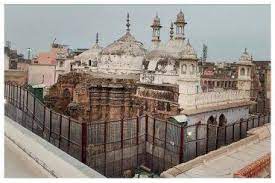The Places Of Worship Act:

An appeal against the video survey of Varanasi’s Gyanvapi mosque will be heard by the Supreme Court.
- The survey, according to a Muslim organisation, is in violation of the places of worship act, 1991.
- During a court-ordered videography survey of the Gyanvapi Masjid complex by a municipal court in Varanasi, a “shivling” was apparently discovered.
- The Gyanvapi Masjid is located near the iconic Kashi Vishwanath temple in Uttar Pradesh’s Varanasi.
The Places Of Worship Act, 1991:
- The Act states that a place of worship’s religious nature must remain the same as it was on August 15, 1947.
- It says no person shall convert any place of worship of any religious denomination into one of a different denomination or section.
- It declares that all litigation, appeals, or other proceedings ongoing before any court or authority on August 15, 1947, involving converting the status of a place of worship, will cease as soon as the law takes effect. There will be no more legal action taken.
The following are exempt from these provisions:
- Ancient and historical monuments and archaeological sites and remains that are covered by the Ancient Monuments and Archaeological Sites and Remains Act, 1958.
- A suit that has been finally settled or disposed of; and any dispute that has been settled by the parties or conversion of any place that took place by acquiescence before the Act commenced.
- The Act also does not apply to the place of worship commonly referred to as Ram Janmabhoomi-Babri Masjid in Ayodhya.
- This law will have an overriding effect over any other law in force.




